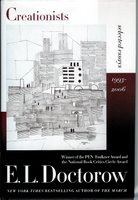
In last week's Chicago Tribune, Richard Stern
looks at the new collection of essays by E.L. Doctorow.
Stern cites the counter example of John Updike, whose voluminous reviews and occasional pieces are a key part of his output: even if you skimmed off the froth Updike always includes in his giant nonfiction collections, you'd be left with essential stuff (and in enormous quantities). For Doctorow, on the other hand, these are finger exercises, earnest and appreciative but fairly lightweight:
Doctorow has no ambition to be an Updikean critic. Most of the 16 brief essays in Creationists are enjoyable, one can learn from them and perhaps also glean some insight into Doctorow's creative procedures and habits of mind, but they mostly make up the sort of brief bedtime reading one can do if one doesn't want to be so absorbed by a long book that one can't bear to put out the light.
All true. However, quite aside from its nifty title, which turns the antediluvian rallying cry on its head,
Creationists does boast some memorable paragraphs. Here's one, from the author's introduction, about the meaning and usefulness of fiction. Surely this subject has been done to death, no? Yet I found Doctorow's take wonderfully succinct and true:
Stories, whether written as novels or scripted as plays, are revelatory structures of facts. They connect the visible with the invisible, the present with the past. They propose life as something of moral consequence. They distribute the suffering so that it can be borne.
That works for me. Bonus points: there's a
Saul Steinberg drawing on the cover.
# posted by James Marcus @ 2:19 PM


 In last week's Chicago Tribune, Richard Stern looks at the new collection of essays by E.L. Doctorow. Stern cites the counter example of John Updike, whose voluminous reviews and occasional pieces are a key part of his output: even if you skimmed off the froth Updike always includes in his giant nonfiction collections, you'd be left with essential stuff (and in enormous quantities). For Doctorow, on the other hand, these are finger exercises, earnest and appreciative but fairly lightweight:
In last week's Chicago Tribune, Richard Stern looks at the new collection of essays by E.L. Doctorow. Stern cites the counter example of John Updike, whose voluminous reviews and occasional pieces are a key part of his output: even if you skimmed off the froth Updike always includes in his giant nonfiction collections, you'd be left with essential stuff (and in enormous quantities). For Doctorow, on the other hand, these are finger exercises, earnest and appreciative but fairly lightweight: 